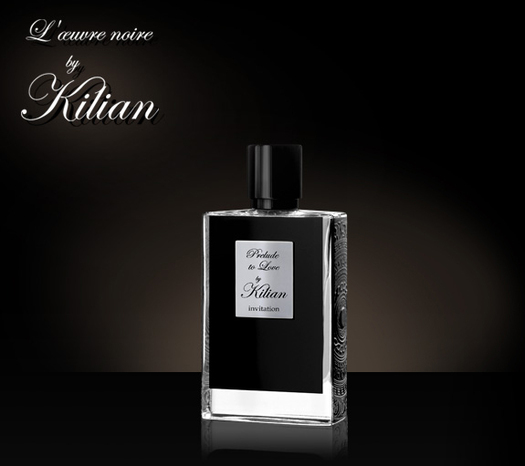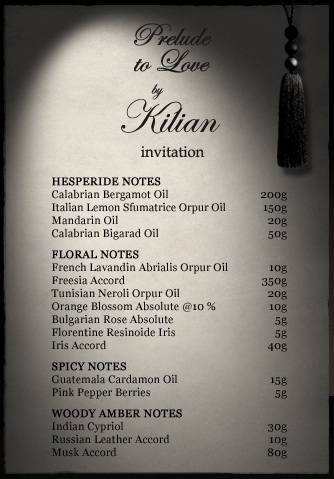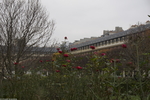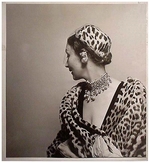By Kilian Prelude To Love, Invitation (2008): Citruses & Preciousness {Perfume Review} {New Fragrance}

Prelude To Love, Invitation is the seventh fragrance under the label By Kilian and part of their collection titled L'Oeuvre Noire (The Black Masterpiece). It was composed by perfumer Calice Becker who signs here her fifth contribution to the line (See TSS's reviews of Love, Beyond Love). She is also the author of well-known fragrances marketed to the mainstream such as J'Adore by Dior and Beyond Paradise by Estée Lauder.
Perfumery-wise the latest By Kilian appears to be a blend in tune with this year's interest for hesperidic compositions, even flirting with the genre of the Eau de Cologne, but almost more as a passing quote than as a main focus. Like for other By Kilian fragrances, literary references are key and shape in this case the personality of this scent inspired by an excerpt from a poem by Arthur Rimbaud, Bonne pensée du matin (good thought of the morning).
The perfume is best understood "read" together with the poem as it does not seem to take it as pretext for a further flight of fancy. Instead, a sense of faithfulness and interpretative effort appears to animate the composition, even possibly dictating its duration. How could a perfume be of epic-recitation length as in a cycle of retelling that lasts for 24 hours when it wishes to recreate the essence of the atmosphere conveyed by a poem, not even the whole poem at that, but a few verses that speak to its creators?...

Prelude to Love, Invitation opens on an extremely lemony attack with an undertone, first of leather (Russian leather) touched by rubber, then doughy iris. The seeming monolithical overture is prevented from being felt as overly simplistic or blocky thanks to the variegated shades of hesperidic notes used: bergamot, lemon, mandarin, bigarade, and also by an underlying complexity buttressing the initial accord that is more felt than smelled. With time, a soft suede-like leather skin sensation hovers above the points of application of the perfume. It is not the sensation of a leather glove slipped onto the hand. It is rather more akin to the cooling ajouré of a white lace-y summer glove that would turn out to smell of leather, air and meadow. The interstices left by the needle work let a fresh breath of air circulate like a caress on the skin, equal part with the more animalistic soft sweep of the leather.
At this point, the confluence of leather, Florentine iris, bouquet of citruses but also the woody-herbaceous papyrus overtones of cypriol or nagarmota suggest a sense of pre-modern cosmopolitan refinement and elegance evocative of a sunny day in the Renaissance period in Italy. Shaded hills and campanili dot a rustic landscape with a thriving merchant city still contained within its folds rather than overshadowing it.
As the scent develops further, it leaves behind the flamboyant citrus fruits and takes on the more subdued personality of an Eau de Cologne that would contain a good dose of iris. It makes me think in fact of the traditional recipe recreated for the Pope's Cologne in this respect.
Perfume for a Poem
Prelude to Love, Invitation is inspired by a poem by Rimbaud. In the excerpt chosen by the brand, it starts with the evocation of a time of the day that is 4 am and ends with the line,"Vers le soleil des Hespérides", "towards the sun of the Hesperides" whose garden was thought by the classical world to be located in the West. The Hesperides who inhabited that garden filled with golden fruits were also known as the nymphs of the sunset. Therefore in just a few short verses we are given a sense of the cyclical passing of one day into the next.
In another sense, the perfume attempts to interpret this idea and image of what a sun of the hesperides could feel like and does so by moving the solar image to the front of the perfume instead of respecting the chronology of the poem. Citrus notes are normally expected to be found in the earliest stage of a perfume as they are naturally the most volatile notes. Thanks to modern technology, the citruses here are prolonged throughout the narrative course of the fragrance although the initial outburst, in order to maintain, one can assume, contrasting power with the rest of the composition and therefore be felt as a sun of the Hesperides, is strongly and deliberately emphasized. It reminds me incidentally of another perfume and perfumer, Antoine Maisondieu, who confesses a love for bergamot and thus injected an overdose of it in Rossy de Palma's opening, which I had commented upon then and mistakenly attributed to Rossy de Palma's own taste. It is in fact Maisondieu himself who loves that effect. In the By Kilian case though it is visibly due to an interpretive effort rather than personal taste although the perfumer must like them.
Just like the selected verses are short, the scent gives the impression of being a short form. After perhaps 20 to 30 minutes, the perfume is mostly expressing itself in the mode of a whisper on the skin, yet at the same time the citrus accord seems to regain some strength and live a second life unmasking further its pungent nature.
It is arguably very hard to create a sense of originality when using hesperidic notes as a focus since it is now such a common scent. François Demachy succeeded in doing so with his Escale à Portofino which took you by surprise with its intertwining of an almond note that felt completely natural, after the fact, creating a new harmony. With Prelude To Love, the attempt at originality is also there but is less convincing on the whole. There is a staccato movement to the unfolding that does not necessarily feel willed. I would say that the perfume seems to be composed of several ideas rather than an overall vision and it lacks some flow. The passage where the nagarmota becomes more prominent together with the citrus continuing to unfold is slightly unusual-smelling but it comes across as one idea rather than as a subtle part of the composition. The stage where the nagarmota pairs with the leather is more arresting.
More than a pyramidal construction the scent seems to offer main facets that are braided together: the citrusy, leathery, floral, woody, spicy, musky ones. This is not a problem in my view; it is the coming together of the locks of hair that feels somewhat a bit disjointed, again.
As the range is priced as an upscale offering, I can foresee that some people will have issues with the joyful uninhibited overdose of citruses - notes that need to be redefined as precious ones by perfumery, as they were in the pre-modern world - as well as with the limited life span of the fragrance, as a more complex composition, unless they go mad for a burst of citruses that feels like a rush of strong mustard coursing through the nostrils and are looking for a different take on an eau fraîche or eau légère or eau de cologne; the scent endures in the form of a simplistic citrusy drydown though. If Prelude To Love is an attempt to be an answer to Eau d'Hadrien by Annick Goutal, a modern citrusy classic from the niche world, one would be well-inspired to ask the die-hard fans of the latter what they think. The weaving-in of nagarmota is interesting, the iris contrasted with citrus can seduce and of course if you love literature you will be tempted to see how a poem can be interpreted.
Bonne pensée du matin by Arthur Rimbaud
(I have boldened out the passages selected by By Kilian
À quatre heures du matin, l'été,
Le Sommeil d'amour dure encore.
Sous les bosquets l'aube évapore
L'odeur du soir fêté.
Mais là-bas dans l'immense chantier
Vers le soleil des Hespérides,
En bras de chemise, les charpentiers
Déjà s'agitent.
Dans leur désert de mousse, tranquilles,
Ils préparent les lambris précieux
Où la richesse de la ville
Rira sous de faux cieux.
Ah ! pour ces Ouvriers charmants
Sujets d'un roi de Babylone,
Vénus ! laisse un peu les Amants,
Dont l'âme est en couronne.
O Reine des Bergers !
Porte aux travailleurs l'eau-de-vie,
Pour que leur forces soient en paix
En attendant le bain dans la mer, à midi.
Mai 1872









